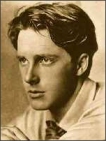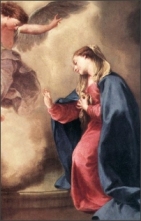Mary and Gabriel
2nd Place in the Sorel Medallion Choral Composition Competition at Carnegie Hall
Voicing: s.a.t.b. soloists, mixed chorus and percussion (1)Text: Rupert Brooke, 1912
Duration: 7 min.
Commissioned: Choral Arts Ensemble of Rochester, Minnesota
Dedication: In loving memory of Mary Joyce Frantz
Premiere: December 8, 2006: Choral Arts Ensemble with Jay Johnson, percussion
Published by: Abbie Betinis Music Co., AB-044-00
Order now: Online order form
Score: PREVIEW THE SCORE (pdf)
LISTEN:
Mary and Gabriel: mp3, 7:20, 6.7 MB
Live performance by Choral Arts Ensemble, Rochester, MN. Michael Culloton, conductor.
PROGRAM NOTE:
Poet Rupert Brooke (1887-1915), who, incidentally, never wore socks, was the most famous of the Georgian poets. He delighted in life, and equally celebrated both the mundane and the extraordinary. He and his many friends in literary circles were known for their progressive thinking, their struggles for women's rights, and political idealism. They knew Brooke as a brilliant companion who "infused the purely academic with the very spirit of youth." Athletic and handsome, Brooke was almost as well-known for his dashing good looks as for his poetry. In fact, the composer must confess she was quite distracted (or shall we say... "inspired") by his picture while working on this musical setting of his compelling and explicit text.
 Much of Brooke's work was inspired by his deep love for England, and his early death in World War I was, according to many poets of the time, "one of England's great literary losses." Indeed, he died at age 27.
Much of Brooke's work was inspired by his deep love for England, and his early death in World War I was, according to many poets of the time, "one of England's great literary losses." Indeed, he died at age 27.In the spirit of Brooke's reputation for "free-thinking," I have taken some liberties with his text, which you can hear in the audio sample. Still, I feel an obligation to reprint here his original (stunning!) poem in its entirety. It appears below, written at age 25.
- Abbie Betinis
Mary and Gabriel
Young Mary, loitering once her garden way,
Felt a warm splendour grow in the April day,
As wine that blushes water through. And soon,
Out of the gold air of the afternoon,
One knelt before her: hair he had, or fire,
Bound back above his ears with golden wire,
Baring the eager marble of his face.
Not man's nor woman's was the immortal grace
Rounding the limbs beneath that robe of white,
And lighting the proud eyes with changeless light,
Incurious. Calm as his wings, and fair,
That presence filled the garden.
She stood there,
Saying, "What would you, Sir?"
He told his word,
"Blessed art thou of women!" Half she heard,
Hands folded and face bowed, half long had known,
The message of that clear and holy tone,
That fluttered hot sweet sobs about her heart;
Such serene tidings moved such human smart.
Her breath came quick as little flakes of snow.
Her hands crept up her breast. She did but know
It was not hers. She felt a trembling stir
Within her body, a will too strong for her
That held and filled and mastered all. With eyes
Closed, and a thousand soft short broken sighs,
She gave submission; fearful, meek, and glad....
She wished to speak. Under her breasts she had
Such multitudinous burnings, to and fro,
And throbs not understood; she did not know
If they were hurt or joy for her; but only
That she was grown strange to herself, half lonely,
All wonderful, filled full of pains to come
And thoughts she dare not think, swift thoughts and dumb,
Human, and quaint, her own, yet very far,
Divine, dear, terrible, familiar...
Her heart was faint for telling; to relate
Her limbs' sweet treachery, her strange high estate,
Over and over, whispering, half revealing,
Weeping; and so find kindness to her healing.
'Twixt tears and laughter, panic hurrying her,
She raised her eyes to that fair messenger.
He knelt unmoved, immortal; with his eyes
Gazing beyond her, calm to the calm skies;
Radiant, untroubled in his wisdom, kind.
His sheaf of lilies stirred not in the wind.
How should she, pitiful with mortality,
Try the wide peace of that felicity
With ripples of her perplexed shaken heart,
And hints of human ecstasy, human smart,
And whispers of the lonely weight she bore,
And how her womb within was hers no more
And at length hers?
Being tired, she bowed her head;
And said, "So be it!"
The great wings were spread
Showering glory on the fields, and fire.
The whole air, singing, bore him up, and higher,
Unswerving, unreluctant. Soon he shone
A gold speck in the gold skies; then was gone.
The air was colder, and grey. She stood alone.
This text -- to the best of my knowledge -- is in the public domain, and may be reprinted from this website for use in concert programs and for promotional use as related to this musical work. Reprinted here is the original poem, which has been edited for use in the musical work.
Young Mary, loitering once her garden way,
Felt a warm splendour grow in the April day,
As wine that blushes water through. And soon,
Out of the gold air of the afternoon,
One knelt before her: hair he had, or fire,
Bound back above his ears with golden wire,
Baring the eager marble of his face.
Not man's nor woman's was the immortal grace
Rounding the limbs beneath that robe of white,
And lighting the proud eyes with changeless light,
Incurious. Calm as his wings, and fair,
That presence filled the garden.
She stood there,
Saying, "What would you, Sir?"
He told his word,
"Blessed art thou of women!" Half she heard,
Hands folded and face bowed, half long had known,
The message of that clear and holy tone,
That fluttered hot sweet sobs about her heart;
Such serene tidings moved such human smart.
Her breath came quick as little flakes of snow.
Her hands crept up her breast. She did but know
It was not hers. She felt a trembling stir
Within her body, a will too strong for her
That held and filled and mastered all. With eyes
Closed, and a thousand soft short broken sighs,
She gave submission; fearful, meek, and glad....
She wished to speak. Under her breasts she had
Such multitudinous burnings, to and fro,
And throbs not understood; she did not know
If they were hurt or joy for her; but only
That she was grown strange to herself, half lonely,
All wonderful, filled full of pains to come
And thoughts she dare not think, swift thoughts and dumb,
Human, and quaint, her own, yet very far,
Divine, dear, terrible, familiar...
Her heart was faint for telling; to relate
Her limbs' sweet treachery, her strange high estate,
Over and over, whispering, half revealing,
Weeping; and so find kindness to her healing.
'Twixt tears and laughter, panic hurrying her,
She raised her eyes to that fair messenger.
He knelt unmoved, immortal; with his eyes
Gazing beyond her, calm to the calm skies;
Radiant, untroubled in his wisdom, kind.
His sheaf of lilies stirred not in the wind.
How should she, pitiful with mortality,
Try the wide peace of that felicity
With ripples of her perplexed shaken heart,
And hints of human ecstasy, human smart,
And whispers of the lonely weight she bore,
And how her womb within was hers no more
And at length hers?
Being tired, she bowed her head;
And said, "So be it!"
The great wings were spread
Showering glory on the fields, and fire.
The whole air, singing, bore him up, and higher,
Unswerving, unreluctant. Soon he shone
A gold speck in the gold skies; then was gone.
The air was colder, and grey. She stood alone.
This text -- to the best of my knowledge -- is in the public domain, and may be reprinted from this website for use in concert programs and for promotional use as related to this musical work. Reprinted here is the original poem, which has been edited for use in the musical work.
Performed by :
Choral Arts Ensemble (Michael Culloton, conductor)
Voices of Ascension (Dennis Keene, conductor)
(Have you performed this piece? Add your performance!)Voices of Ascension (Dennis Keene, conductor)

